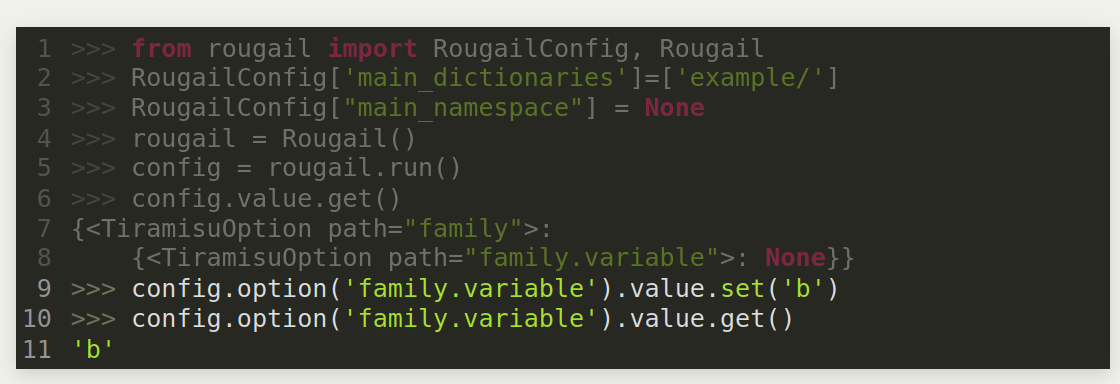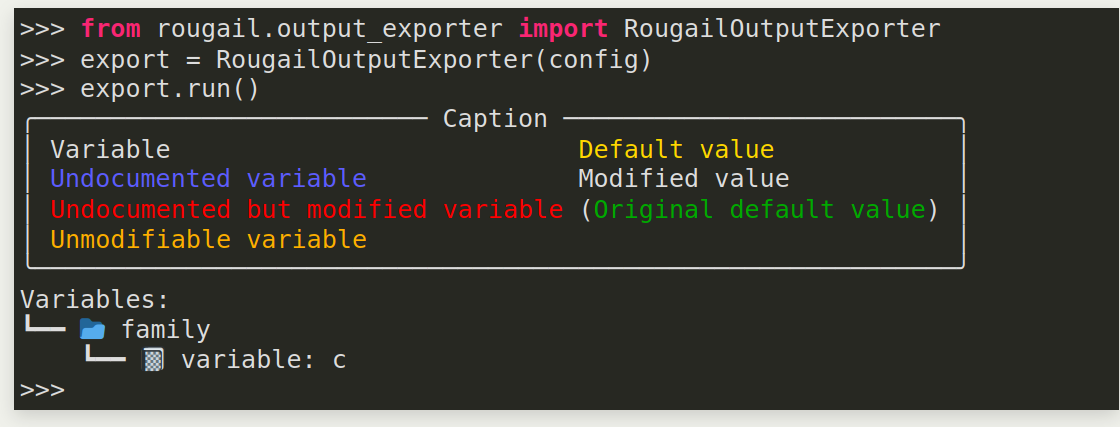Rougail’s library description
Rougail is a configuration management library that allows you to load variables in a simple and convenient way.
In the following examples, we will use a specific configuration of Rougail. You will find all the configuraiton options in Customizing Rougail’s configuration.
To load the configuration you must import the RougailConfig class and set the dictionaries_dir values:
from rougail import RougailConfig
RougailConfig['dictionaries_dir'] = ['dict']
Let’s convert a structure file
As a reminder, a structure file is a set of instructions that will allow us to create families and variables.
Let’s start by creating a simple structure file.
Here is a first dict/00-base.yml structure file:
---
version: '1.1'
my_variable:
default: my_value
Then, let’s create the Tiramisu objects via the following script:
script.py file contentfrom rougail import Rougail, RougailConfig
RougailConfig['dictionaries_dir'] = ['dict']
rougail = Rougail()
config = rougail.get_config()
print(config.value.get())
Let’s execute script.py:
$ python3 script.py
{'rougail.my_variable': 'my_value'}
The operator role
The operator role corresponds to the tiramisu settings:

But instead of coding in the end user developer way, the opterator will prefer using the Rougail CLI interface:

The Rougail CLI can output a rather complete view of the dataset:

Let’s convert an extra structure file
The default namespace for variables and families is rougail. It is possible to define other namespaces. These additional namespaces are called extras.
Additional namespaces are defined during configuration.
For example, here’s how to add an example namespace:
RougailConfig['extra_dictionaries']['example'] = ['extras/']
Then let’s create an extra structure file extras/00-base.yml:
extras/00-base.yml file content
—
version: ‘1.1’
my_variable_extra:
Then, let’s create the Tiramisu objects via the following script.py script:
script.py file contentfrom rougail import Rougail, RougailConfig
RougailConfig['dictionaries_dir'] = ['dict']
RougailConfig['extra_dictionaries']['example'] = ['extras/']
rougail = Rougail()
config = rougail.get_config()
print(config.value.dict())
Let’s execute script.py:
$ python3 script.py
{'rougail.my_variable': 'my_value', 'example.my_variable_extra': 'my_value_extra'}
Let’s create a custom function
We create the complementary structure file named dict/01-function.yml so that the my_variable_jinja variable is calculated:
---
version: '1.1'
my_variable_jinja:
type: "string"
default:
type: jinja
jinja: "{{ return_no() }}"
Then let’s define the return_no() function in functions.py:
functions.py contentdef return_no():
return 'no'
Then, let’s create the Tiramisu objects via the following script:
script.py file contentfrom rougail import Rougail, RougailConfig
RougailConfig['dictionaries_dir'] = ['dict']
RougailConfig['extra_dictionaries']['example'] = ['extras/']
RougailConfig['functions_file'] = 'functions.py'
rougail = Rougail()
config = rougail.get_config()
print(config.value.dict())
Let’s execute script.py:
$ python3 script.py
{'rougail.my_variable': 'my_value', 'rougail.my_variable_jinja': 'no', 'example.my_variable_extra': 'my_value_extra'}
The value of the my_variable_extra variable is calculated, and it’s value comes from the return_no() function.
Create your own type
A variable has a type. This type enables the variable to define the values that are accepted by this variable.
There is a series of default types, but obviously not all cases are taken.
It’s possible to create your own type.
Here an example to a lipogram option (in a string, we cannot use “e” character):
lipogram.py file contentfrom tiramisu import StrOption
class LipogramOption(StrOption):
__slots__ = tuple()
_type = 'lipogram'
def validate(self,
value):
super().validate(value)
# verify that there is any 'e' in the sentense
if 'e' in value:
raise ValueError('Perec wrote a book without any "e", you could not do it in a simple sentence?')
To add the new lipogram type in Rougail:
>>> from rougail import Rougail, RougailConfig
>>> RougailConfig['dictionaries_dir'] = ['dict']
>>> RougailConfig['custom_types']['lipogram'] = LipogramOption
Now, we can use lipogram type.
Here is a dict/00-base.yml structure file:
---
version: '1.1'
var:
type: lipogram
>>> rougail = Rougail()
>>> config = rougail.get_config()
>>> config.option('rougail.var').value.set('blah')
>>> config.option('rougail.var').value.set('I just want to add a quality string that has no bad characters')
[...]
tiramisu.error.ValueOptionError: "I just want to add a quality string that has no bad characters" is an invalid lipogram for "var", Perec wrote a book without any "e", you could not do it in a simple sentence?
Upgrade dictionnaries to upper version
All dictionnaries has a format version number. When a new format version is proposed, it is possible to automatically convert the files to the new version.
We create a term:structure file named dict/01-upgrade.yml with version 1.0:
---
version: '1.1'
my_variable:
multi: true
my_dyn_family:
type: "dynamic"
variable: my_variable
a_variable:
>>> from rougail import RougailUpgrade, RougailConfig
>>> RougailConfig['dictionaries_dir'] = ['dict']
>>> upgrade = RougailUpgrade()
>>> upgrade.load_dictionaries('dict_converted')
The term:structure file named dict_converted/01-upgrade.yml is in version 1.1:
version: '1.1'
my_variable:
multi: true
my_dyn_family:
type: dynamic
a_variable: null
dynamic:
type: variable
variable: my_variable
propertyerror: false